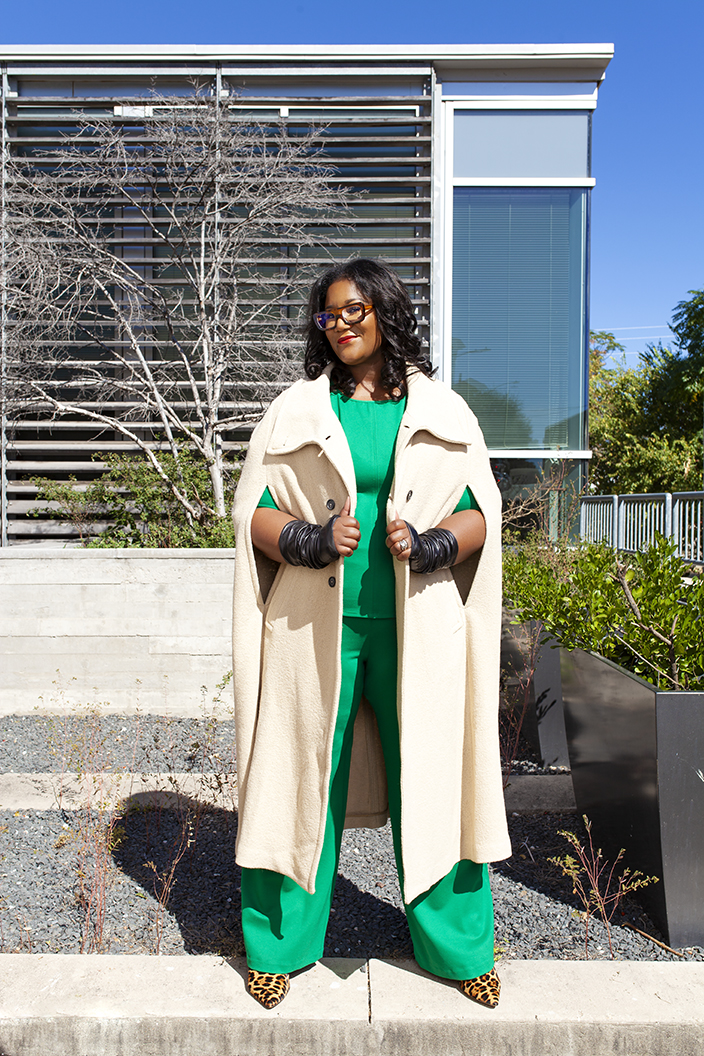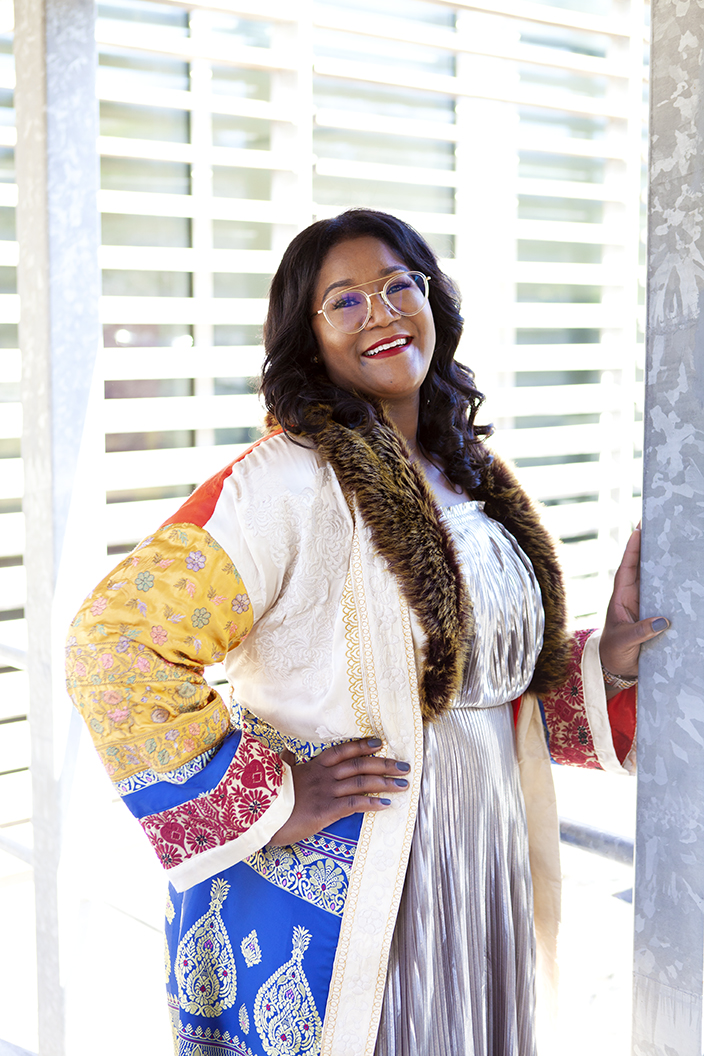Ada-Renee Johnson is on a mission to diversify the tech industry.
By Sabrina LeBoeuf, Photos by Rudy Arocha

St. Louis remembers August 2014. It was the month police officer Darren Wilson shot and killed Michael Brown on Canfield Drive in Ferguson. His body remained uncovered on the pavement for four hours, and the crime sparked several nights of protests afterward. The nation’s eyes were on Missouri.
Ada-Renee Johnson, a new mother, an HR thought leader and strategist and a St. Louis native, watched it all unfold on her television from her home in Hayward, California, a city in the San Francisco Bay Area. It still felt close. From her couch, she recognized the images of her hometown. The streets and people who contributed to the person she had become, broadcasted on national news outlets.
“I am what I’ve experienced,” Johnson says.
It was the place where she fell in love with roller skating and glided with smooth grace every Sunday at Saints Olivette Family Roller Skating Center. Saturdays were for skating at The Palace. When she came of age, Johnson drank beer and visited the Clydesdales at the Anheuser-Busch headquarters and ate toasted ravioli dipped in marinara sauce at Busch Stadium.
Each May, she celebrated the Annie Malone May Day Parade by marching in the procession or sitting on the sidelines to see the local dance teams and the high school bands. The following month brought Juneteenth festivities.
Back in Hayward, the television announced Brown had graduated from Normandy High School eight days earlier. Johnson’s mother was the principal there, and though she didn’t know him personally, she had handed him his diploma. This was really close.
Johnson turned to look at her son, Kade, running around in his bouncer. The carefree 1-year-old had just learned how to walk right as another boy had his life taken away from him. Johnson knows the color of her son’s skin will precede him wherever he goes. As he grows up, she will need to work with her husband and her own father to teach Kade the importance of showing up as a strong Black man, unafraid. He has a voice and the power to use it, no matter where he is or the situation.
“Heritage is the past, but it’s also the present,” Johnson says. “So what I’m experiencing now as an adult, as a mother, as a wife, I am defining heritage every day. But I’m also responsible for building that heritage for my children.”
Today, Johnson’s building heritage for her children in Austin, Texas.

Her family moved here in 2016, after relocating to Nebraska and giving birth to her daughter, Knox, for her new job at Google Austin. The state lacked Missouri’s four seasons. But with a family where everyone was born in a different state, Texas was to be a point of commonality. The Johnsons were going to plant their roots and reconnect with old ones—Ada’s grandmother was born and raised in San Antonio.
She and her husband, Brandon Johnson, visited San Antonio as part of their church’s marriage retreat in July 2017. The couple explored the city in their free time, but solely breathing the air was enough for Ada. The family began a tradition of taking the kids to San Marcos for new cowboy boots to fit their ever-growing feet. When Kade turned 5, his dad took him to his first Longhorn football game. And even though the Johnsons already said “y’all” before coming to Austin, Knox picked up a Texas twang. Ada’s still working on her queso-making skills, but she knows where to get the good stuff.
Beyond eating tacos on Tuesdays and wanting to teach her kids how to roller skate, Johnson defines heritage for her family through her work. She hopes to set an example for other professionals so they can get it right for her children in the future.
Ada-Renee Johnson on a Mission
She’s specifically on a mission to dispel a myth that the technology industry isn’t open to Black people or women. According to Google’s 2020 Diversity Annual Report, women make up 32% of their workforce. As for race and ethnicity, Black Googlers represent 3.7% of the workforce. Both statistics have increased 0.4% from the 2019 report. To help diversify both Google’s landscape and the tech industry as a whole, Johnson makes herself available to others. Whether as a facilitator at the Capital Factory’s annual Women in Tech Summit, a panelist for Persian Women in Tech or a speaker at her alma mater, Spelman College. Her main goal is to build confidence in others to apply for jobs in technology and to show up as their full selves in the workplace.
“Look, I have a degree in English literature, and I work at one of the biggest tech companies,” Johnson says. “Here’s how I use my degree, here’s why my degree is needed in this space and here’s why you are needed in this space. It’s the intersection of your faith, your person, your experiences and your exposure that impact the company.”
When Ada shows up to work, she’s always her complete self.
Rather than having separate calendars for work and her personal life, she schedules out everything together—meetings, gym time and picking up her kids—to clearly present herself as a working mom and set the boundaries she needs. She’s an active member in Google Employee Resource Groups, including the Black Googler Network, Women@Google and the Inter Belief Network. As the daughter of a military family, she also regularly partners with the Google Veterans Network. Even her love for roller skating comes into play. She knows how to skillfully fall and pop right back up.
“Who shows up as a Christian at work?” Johnson says. “I do, and we have T-shirts to prove it. My faith very much leads how I respond to people in situations.”
Right after she arrived at Google Austin to manage a team of sourcers, she was tapped on the shoulder by Google’s Director of Global Recruiting Channels, Greg Garrison, and asked to be the head of diversity staffing. She disregarded the idea of changing roles.
My faith very much leads how I respond to people in situations.
She reasoned that she had a commitment to the position she originally came for. Even though people throughout her life predicted her to lead rooms of people someday, as an introvert, she never envisioned that for herself.
The opportunity was brought to her a second time. Then a third. Each time, she declined the offer. Brandon wondered why she kept saying no and encouraged her to accept the position.
“I don’t know that she realizes the true potential that she possesses and the true power that she has,” Brandon says.
Ada then realized why she kept saying no.
She felt afraid that she would not be the best person for the job. With this epiphany, she decided to take on the new role. If she was going to be a cheerleader for others, she needed to advocate for herself as well. She became responsible for leading a team of 21 people. All with the common goal of diversifying Google’s landscape, specifically in tech.
To make up for her insecurities, she tapped into her past experiences on the volleyball and basketball courts. She played both sports throughout college and was well aware of the difference in her confidence levels when playing volleyball games vs. leading work meetings. As an athlete, Johnson focused on the skills she had been taught and felt confident that she couldn’t be outplayed. She needed to recreate this mindset in her career and position herself as a subject-matter expert.
She read case studies, took a coding course and talked to software engineers to find out how recruiters could effectively communicate with potential candidates. However, after asserting herself and working with her team to break down barriers, Johnson had another realization. Her leadership didn’t inherently come from her expertise. It came from her experiences of being managed by others. She understood her own likes and dislikes as well as the importance of listening to her team members and helping them navigate their careers. She realized that she is an influencer of people.
“The sky’s the limit for Ada,” Garrison says. “She’s navigated Google’s biggest challenges, but also has aligned herself to work that’s meaningful and fulfilling for her.”
Dynamic Young women
Almost two years later, as part of Black Googler Network, Johnson went on to participate at the Dynamic Young Women’s Workshop, an event dedicated to empowering young women in Austin with the mindset and skills to navigate the technology industry. She spoke on a panel about navigating the tech space as someone who did not grow up in tech. Each conversation felt like ones she’d had as a child with family members. She wanted to be that same extended network for these young women.
“I have an obligation to young women coming up around me,” Johnson says. “If I don’t get it right for them, they won’t be able to get it right for my daughter.”

On Feb. 8, 2019, she witnessed an example of the impressive young women who would set the stage for the future at the inaugural Elevate: Diversity & Inclusion Conference. The event was created by University of Texas at Austin MBA students Ashley Fox and DeAndrea Staes to discuss strategies for transforming diversity and inclusion efforts into an organization’s core values.
Similar to other speaking engagements, Johnson imparted her wisdom and knowledge unto the participants, but this time felt different. She watched as two young women, Fox and Staes, identified a gap in recruiting underrepresented groups for MBA programs and filled it. She saw two young women propose an idea without ever considering “no” as an answer.
“If a college student can notice a gap and fill it, as a working professional, I have to be able to do the same. And I have a responsibility to teach my children to do the same thing,” Johnson says.
Ada and Brandon want to teach Kade and Knox that the sky’s the limit; their ceiling is their children’s floor.
However, they have tougher lessons to share as well.
In May, just before Kade turned 7 years old, Knox took notice of the television playing in the background. She asked, “Why won’t he get off his neck?”
She was referring to a video of George Floyd’s murder. On May 25, 2020, he died in Minneapolis, Minnesota, as police officer Derek Chauvin knelt on his neck for 8 minutes and 46 seconds. The revelation of the video led to protests across the United States and a discussion in the Johnson family household. Kade wasn’t a baby in his bouncer anymore. It was time for the talk.
Knox received a brief explanation about the video, but there was a deeper conversation with Kade. He asked if his white friends would still be his friends when school returned. The question brought tears to Ada’s eyes. “Who would have thought in 2020 this would be the question that a 6-year-old boy is asking?”
I have an obligation to young women coming up around me.
If I don’t get it right for them, they won’t be able to get it right for my daughter.
As Kade’s parents, Ada and her husband had to give their son an honest response. They didn’t know what conversations Kade’s white friends were having. But they hoped he wouldn’t end a friendship just because a friend was white.
Bringing Our Differences Together
Soon after, Alisha Lagarde, mother to Kade’s friend Brooks, reached out. Brooks and Kade had done Zoom calls over the past few months. But, being second-graders, it just wasn’t the same as hanging out in person. Lagarde asked about the Johnson family’s quarantine practices before proposing a COVID-safe play date. Johnson agreed. Her son needed to see that his white friend was still his friend.
Lagarde opened the door to her house to find the Johnsons wearing their masks. There was a moment of awkwardness as to how they would navigate their first play date together during the pandemic. But Largarde quickly dispelled those feelings; she welcomed them inside and invited them to swim in the pool. The boys jumped in the water together.
Johnson and Lagarde chatted about their lives and their faith. Their children attend St. Austin Catholic School together even though the Johnsons are members of Greater Mt. Zion Church and Largarde is Jewish. When Johnson found out, she had to know if Lagarde made good challah bread. (Growing up, Johnson’s church would celebrate Thanksgiving service with the synagogue around the corner.)
All the while, the mothers watched their sons rejoice in their play date. It was a reminder of their youth and innocence despite the ongoing world around them.
“We’re going to play together, bringing our differences together in a shared space,” Johnson says. “I thought it was amazing because it meant more for me than he knows now.”

